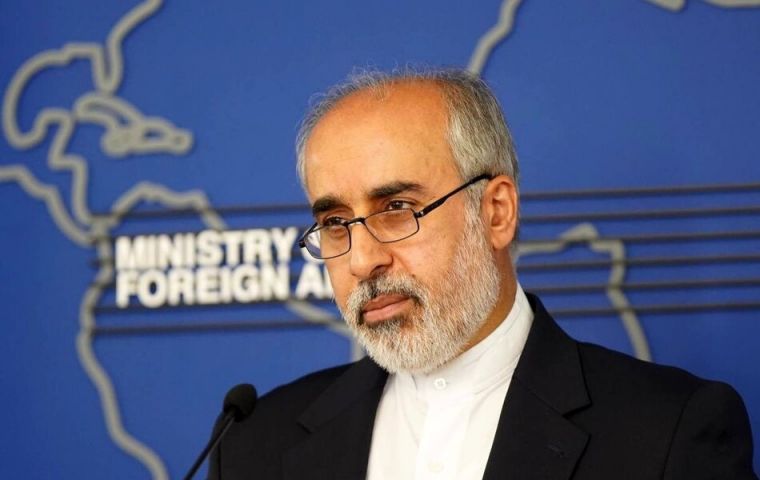MercoPress. South Atlantic News Agency
Iran's Foreign Ministry says BA Court ruling against Tehran was politically motivated
 Kanani blamed “the Zionist regime” for the Buenos Aires Court's decision
Kanani blamed “the Zionist regime” for the Buenos Aires Court's decision Iran's Foreign Ministry Spokesman Naser Kanani said Thursday that a ruling by a Buenos Aires court that found his country to be behind terrorist attacks against a building of the Jewish community in the Argentine capital in 1994 was “politically motivated.” He also said the decision lacked any legal basis and merely followed the “new political project” undertaken by the “enemies of Iran.”
The Argentine magistrates found Tehran and the Lebanese Shiite militia Hezbollah guilty of the bombing of the Israeli-Argentine Mutual Association (AMIA) in Buenos Aires, which killed 85 people and injured hundreds of others. Kanani insisted that the verdict was based on “unfounded” allegations. “The fact that the case is being investigated by another court shows that this ruling is a clear sign of an attempt to divert the investigation,” Kanani stressed.
In his view, the ruling was “a clumsy move” aimed at “the implementation of a new political project by Iran's enemies, especially the Zionist regime.” He also recalled that Tehran “has supported any constructive initiative, including the signing of a memorandum of understanding to establish an investigation committee in connection with the AMIA bombing.”
“Unfortunately, the actions on the part of those who do not want to uncover the truth have led to a sacrifice of justice for their political goals,” Kanani further argued in a statement published on the Iranian Foreign Ministry's website. “The Zionist regime tries to distract public opinion from its crimes through various means,” the note also reads.
“It is clear to all that during the past few months there have been strong condemnations against the Zionist regime among the world public opinion for committing war crimes and the heinous murder of civilians, especially children, and women, in the Gaza Strip,” Kanani went on.
Tel Aviv welcomed the ruling and called on the pro-Israel administration of President Javier Milei to formally declare the Iranian Revolutionary Guard as a terrorist organization, which would help “stop the Iranian aggression,” according to Foreign Minister Israel Katz.
On July 18, 1994, at 9:53 a.m. local time, a car bomb exploded in front of the AMIA headquarters killing 85 people and injuring hundreds. It was the deadliest attack ever committed on Argentine soil and the largest attack on Jewish targets outside Israel since World War II. Argentina remains the only Latin American country ever to have suffered an attack linked to the seemingly endless Middle East crisis.
Buenos Aires was reported to be entertaining the possibility of a trial in absentia of foreign operatives believed to be behind the bombing.
Last week's ruling also determined that the AMIA bombing as well as the one against Israel's Embassy in Buenos Aires in March 1992 in which 22 people died were crimes against humanity, and, therefore, no statute of limitations was applicable. They upheld a decision by Judge Rodolfo Canicoba Corral's lower court almost two decades ago. The appellate court of Judges Carlos Mahiques, Ángela Ledesma, and Diego Barroetaveña also pointed out that both attacks were planned from Iran and executed by Hezbollah, an organization they defined as a virtual armed wing for terrorist actions.




Top Comments
Disclaimer & comment rulesCommenting for this story is now closed.
If you have a Facebook account, become a fan and comment on our Facebook Page!